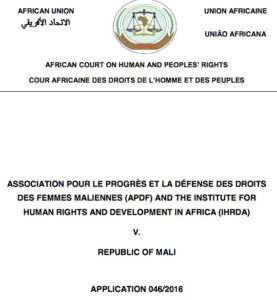On 16 May 2017 the African Court held the public hearing in APDH and IHRDA v. Mali. This case is chiefly notable as the first African Court case to specifically consider the rights of women. In particular it focuses on a recently enacted Malian law that the applicants allege violates the Protocol to the African Charter on Human and Peoples’ Rights on the Rights of Women (otherwise known as the Maputo Protocol), the Convention on the Elimination of All Forms of Discrimination Against Women (CEDAW) and the African Charter on the Rights and Welfare of the Child (ACRWC). You can watch the hearing (in French) here.
The case can also lay claim to another first which is subject of this short post; peruse the African Court’s case summary and you will see the alleged violations of the Maputo Protocol, CEDAW and ACRWC, but no alleged violations of the African Charter on Human and Peoples’ Rights– as far as I can tell, a first for the African Court.

It is important to clarify that nothing in the African Court’s rules or Protocol prevent this situation. Under Article 3.1 of the African Court Protocol, the African Court has jurisdiction to hear applications concerning not only the African Charter, but also “any other relevant human rights instrument ratified by the States concerned”. There is no requirement that an application must contain violations of the African Charter. What is interesting however is that until now it has been common practice for applicants to allege violations of the African Charter and in addition other international human rights instruments, so for example in a fair trial case alleging violations of Article 7 of the African Charter and in addition Article 14 and Article 15 of the ICCPR.
As Tetevi Davi discussed recently at The Monitor, in the 2016 case of APDH v Cote d’Ivoire, the African Court examined the meaning of “any other relevant human rights instrument” under Article 3.1 of the African Court Protocol, giving the term a broad interpretation to include the African Charter on Democracy, Elections and Governance (2007) (Democracy Charter) and the ECOWAS Protocol on Democracy and Good Governance (2001) (ECOWAS Protocol).
This latest Malian case represents a significant upshift for the African Court as it stretches its jurisdiction even further, by considering violations of international human rights instruments other than the African Charter. This evolution is (for international law anyway) taking place at quite a pace. As I have written before, it was not long ago that the African Court purposefully avoided stepping into international waters, making findings on violations of the African Charter, but stopping short of making findings on international inducements such as the ICCPR. For example in the 2014 Zongo et al. v. Burkina Faso Judgement the African Court decided at para. 188 that “having the decided on the alleged violation of the freedom of expression on the basis of article 9 of the [African] Charter, it does not find necessary to rule on the allegation on the basis of article 19(2) of the ICCPR”.

Fast forward to 2017 and we are now seeing the African Court making findings on the ICCPR (see for example the Alex Thomas v. Tanzania Judgement), setting a broad jurisdiction to include international and regional human rights instrument (as in APDH v Cote d’Ivoire) and now handling its first completely non-African Charter case.This move is not only fast but I think also goes to show the African Court growing in confidence. Of course, this case relates to two Africa-specific human rights instruments in the form of the Maputo Protocol and ACRWC, as well as the CEDAW, but there is no reason, at least on paper, why the African Court could not go one stage further and consider cases alleging violations of the ICCPR or other global human rights instruments only. With this in mind though, its worth considering the potential for friction these moves with other African institutions. For example, how does the ECOWAS Court of Justice view the African Court setting out in APDH v. Cote d’Ivore that the Democracy Charter is w
ithin its jurisdiction? Or what is the African Committee of Experts on the Rights and Welfare of the Child (ACERWC) take on the African Court deciding ACRWC specific cases when it is principally in existence to consider these very same issues? This possible tension is partly as a result of the overlapping jurisdictions of various human rights institutions across Africa, and is unavoidable all the while these separate institutions remain in existence.

But should the African Court ‘keep in its lane’ so to speak and consider only alleged violations of the African Charter with other human rights instruments ancillary and in addition to the African Charter? Certainly the African Court Protocol allows the African Court to consider all kinds of cases, not only restricted to the African Charter; in this sense its working within its jurisdictional boundaries. These issues will likely become more prescient depending on whether APDH and IHRDA v. Mali will be a one-off or whether its indicative of a trend that will see the African Court consistently take on non-African Charter cases. Whatever the outcoe, this case serves as another first in the African Court’s continued growth
